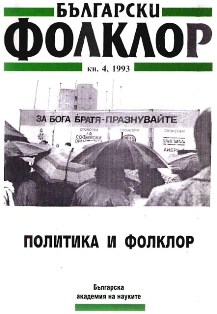Архаични модели и тоталитаризъм
Archaic Cultural Patterns and Totalitarianism
Author(s): Milena Benovska-SabkovaSubject(s): Anthropology
Published by: Институт за етнология и фолклористика с Етнографски музей при БАН
Summary/Abstract: After WWII totalitarianism domineered in industrially less developed countries and that determined some special characteristics of the interrelationship between the social system and the cultural process. The transposition of social strata after the war brought power to people who were closely related to the traditional rural culture, and that gave access for some archaic cultural patterns to the structure of political power. Thus, the following phenomenon appeared which was typologically similar to African tribalism – implantation of kinship structures into the upper stages of power, i.e. important positions were taken by the members of well-known clans (in Bulgaria, Romania, North Korea, partly in the ex-USSR and others). In a much broader social aspect another form of hypertrophy of kinship relationships and traditional cooperation was in expansion – the so called “connections”. The constant lack of goods and services, as well as the faults of the centrally planned economy, decreased the importance of money as a means of economic exchange. “Connections”, however, partly took over the functions of money and acted as tools for economic and social exchange: for instance, finding “connections” for a child to be enrolled in a kindergarten could be changed for “connections” for receiving a driving-licence. Some innate traits of totalitarianism enabled it not only to develop and deform archaic cultural patterns, but to reproduce of them as well. This is mostly valid for the binary logic – thinking through a system of binary oppositions is characteristic not only for archaic cultures, but also for totalitarian regimes. Consequently, that resulted in the ultimate polarization of the Bulgarian society that was to be observed after the democratic changes took place there.
Journal: Български фолклор
- Issue Year: XIX/1993
- Issue No: 4
- Page Range: 3-14
- Page Count: 12
- Language: Bulgarian
- Content File-PDF

